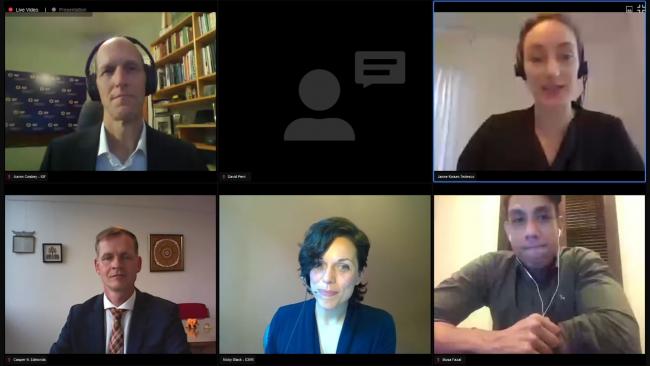The impacts of COVID-19 on the mining industry are a major focus of this year’s Annual General Meeting (AGM) of the Intergovernmental Forum on Mining, Minerals, Metals and Sustainable Development (IGF). The 16th AGM opened today and is the first to take place in a virtual format, due to travel restrictions stemming from the COVID-19 crisis. In meeting polls, many welcomed the virtual format as enabling many more participants to engage in the deliberations.
Isabelle Ramdoo, Deputy Director, IGF, opened the meeting, saying this year’s theme aims to bring a diverse range of perspectives on how the mining sector is navigating the COVID-19 crisis, and how governments are responding to the challenge.
Aissatou Sophie Gladima, Minister of Mines and Geology, Senegal, outlined the difficulties COVID-19 has posed to the Senegalese mining sector, including the decreased mobility of workers, health and safety concerns, and potential large-scale downsizing.
Norbert Barthle, Parliamentary State Secretary to the Federal Minister for Economic Cooperation and Development, German Federal Ministry for Economic Cooperation and Development (BMZ), said that the pandemic presents an opportunity to transition to a more sustainable global economy, with sustainable supply chains being central to this.
Luis Miguel Incháustegui Zevallos, Minister of Energy and Mines, Peru, underscored that mining activities require the trust and buy-in of local communities, and that the sector also needs to improve its competitiveness.
Daniel Kaufmann, President Emeritus, Natural Resource Governance Institute (NRGI), outlined global challenges including: the COVID-19 pandemic; a global economic downturn; climate change; and increasing natural resource demand. He cited integrated resource planning as a way to address these challenges.
Participants discussed the future of mining employment and skills, noting the International Labour Organization (ILO) estimate of the number of working hours lost to COVID-19 equates to 500 million full-time jobs. Other topics addressed were building resilient communities, current work on a global tailings management standard, and mine closure policy.
The Council on Ethics, Swedish National Pension Funds and the International Council on Mining and Metals (ICMM) presented on work that was done to develop and consult widely on a new Global Industry Standard on Tailings Management, following the tragic collapse of the Brumandinho tailings dam in Brazil in January 2019, killing 270 people. The global standard was published in August 2020.
Participants discussed mine closure policies, and the need for financial assurance to support closure. They considered the experiences of regulators in Papua New Guinea, Namibia and Argentina, highlighting the need to consider closure as an integral part of the mining life-cycle.
Participants will continue their discussions over the next two days, and the IGF Council will also meet in a closed session.





